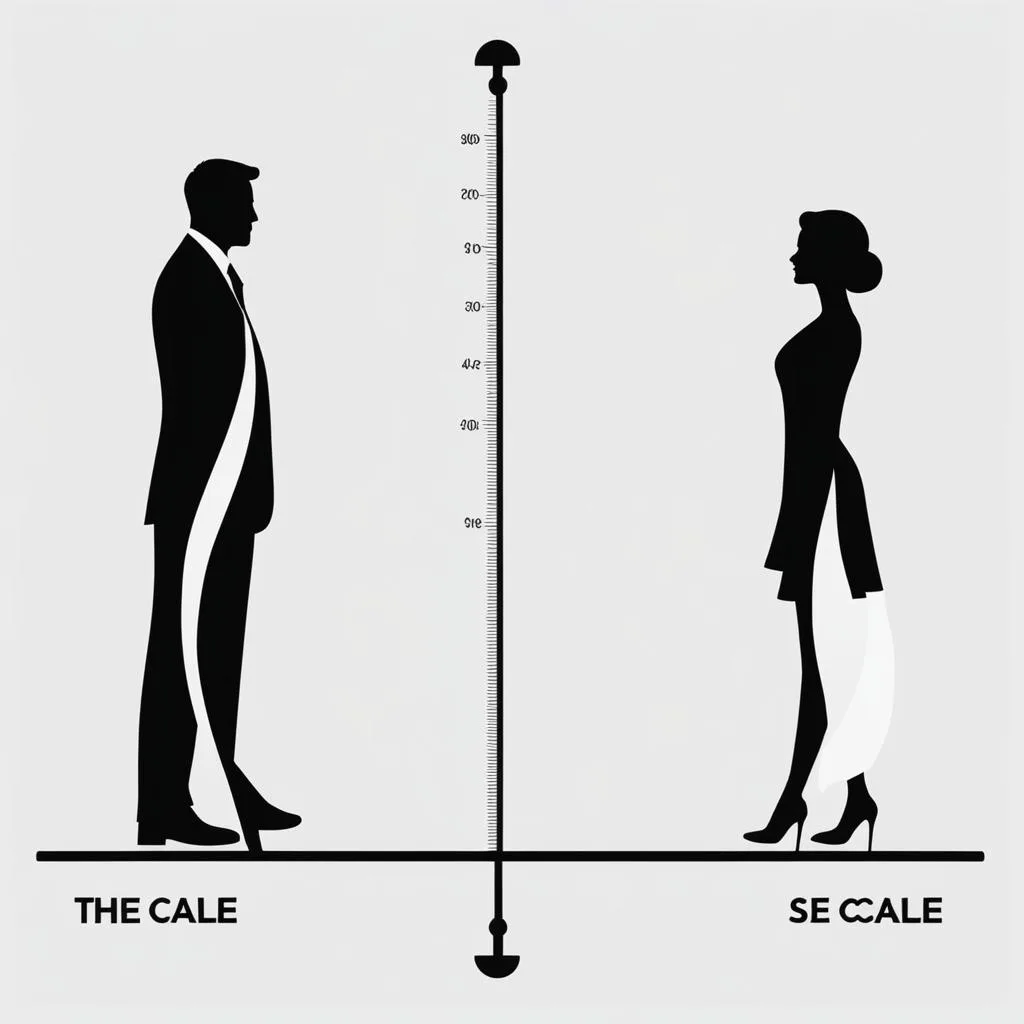Weight loss can be a challenging journey, and it can be especially frustrating for women when they compare their progress to that of men. It’s a well-known fact that men tend to lose weight faster than women, but why is this the case? In this section, we will explore the gender differences in weight loss and the reasons why men have an inherent advantage.
Key Takeaways:
- Men tend to lose weight faster than women.
- There are physiological and hormonal differences between men and women that can impact weight loss.
- Factors such as muscle mass, metabolism, and hormonal influences contribute to the gender gap in weight loss.
- Effective weight loss strategies for men include balancing nutrition and caloric intake, incorporating exercise, and addressing mental and emotional well-being.
- Maintaining weight loss and healthy lifestyle habits are crucial for long-term success.
Understanding Gender Differences in Weight Loss
Weight loss can be a challenge for both men and women alike; however, studies have shown that there are differences in how men and women lose weight. These differences can be attributed to a variety of physiological and hormonal factors that are unique to each gender.
Men generally have more muscle mass than women, which plays a crucial role in weight loss. Muscle burns more calories than fat, which means that men have a higher basal metabolic rate (BMR) than women. This higher BMR results in men being able to burn more calories at rest, even when they are not engaged in physical activity.
Another factor that contributes to the gender gap in weight loss is hormones. Men have higher levels of androgens, such as testosterone, which help to burn fat and build muscle. Women, on the other hand, have higher levels of estrogen, which can increase the storage of body fat.
These gender differences in weight loss can contribute to what is known as the “weight loss gender gap.” Research has shown that men tend to lose weight more quickly than women, even when they are following the same diet and exercise regimen.
It is important to understand these differences when embarking on a weight loss journey. By tailoring your approach to your gender, you may be able to optimize your weight loss results.
Physiological and Hormonal Differences Between Men and Women
| Factors | Men | Women |
|---|---|---|
| Muscle Mass | Have more muscle mass than women | Have less muscle mass than men |
| Basal Metabolic Rate | Have a higher BMR than women | Have a lower BMR than men |
| Hormones | Higher levels of androgens such as testosterone | Higher levels of estrogen |
The Science Behind Men’s Weight Loss Advantage
It is a fact that men tend to lose weight at a faster pace than women. This is primarily due to the physiological differences between the two genders.
One of the major factors that contribute to men’s weight loss advantage is their higher muscle mass. Muscle is metabolically active and burns more calories than fat does, even at rest. Studies have shown that men generally have more muscle mass than women, which means they burn more calories, even when they are not exercising.
Men also have higher levels of testosterone, which can impact weight loss. Testosterone promotes the growth of lean muscle mass and is associated with a higher metabolic rate, which can support weight loss efforts.
Another factor that plays a role in men’s weight loss is metabolism. Men tend to have faster metabolisms than women, meaning they burn more calories at rest. This can help them achieve weight loss goals more quickly.
Table: Comparison of Men and Women’s Clicks per Minute (CPM) in Resting State
| Men | Women | |
|---|---|---|
| Age 18-24 | 65-85 | 62-78 |
| Age 25-34 | 62-82 | 60-76 |
| Age 35-44 | 58-75 | 56-72 |
| Age 45-54 | 55-70 | 53-68 |
Overall, the science behind men’s weight loss advantage lies in their higher muscle mass, faster metabolism, and higher levels of testosterone. However, it’s important to note that each individual’s weight loss journey is unique and may vary depending on factors such as age, diet, and exercise habits.
Effective Weight Loss Strategies for Men
At [Brand Name], we understand that weight loss can be a challenging journey, but with the right strategies and a positive mindset, it is achievable. Men have unique weight loss needs and require tailored solutions to achieve their desired results. In this section, we will provide practical and effective weight loss strategies specifically tailored for men.
Diet
Diet plays a crucial role in weight loss. For men to lose weight effectively, they need to be in a caloric deficit. This means consuming fewer calories than their body burns. To achieve this, men can focus on eating whole, nutrient-dense foods such as lean meats, vegetables, fruits, and whole grains. It is also important to limit consumption of processed foods, sugary drinks, and alcohol. A balanced meal plan that includes all essential nutrients and vitamins is key to achieving weight loss goals.
Exercise
Regular exercise is essential for weight loss. Men should aim for at least 150 minutes of moderate-intensity exercise per week. This can include cardio exercises such as running, cycling, or swimming, as well as strength training exercises such as weight lifting. It is important to vary exercises and challenge the body to prevent hitting a plateau. Exercise should also be enjoyable and sustainable to encourage consistency in weight loss efforts.

Lifestyle Changes
Small lifestyle changes can have a big impact on weight loss. Men can try reducing sedentary behaviors such as sitting for long periods of time, and opt for standing or walking instead. They can also prioritize getting enough sleep as sleep deprivation can lead to weight gain. In addition, reducing stress through yoga or meditation can help regulate hormones that affect weight loss.
Goal Setting and Accountability
Setting realistic and achievable weight loss goals and tracking progress can help men stay motivated. Accountability can also be beneficial, whether through a support group or working with a personal trainer or nutritionist. At [Brand Name], we offer personalized coaching and support to help men achieve their weight loss goals.
Summary
Effective weight loss strategies for men require a combination of diet, exercise, lifestyle changes, and support. By setting realistic goals and adopting healthy habits, men can achieve sustainable weight loss and maintain a healthy lifestyle. At [Brand Name], we are committed to helping men optimize their weight loss journeys through personalized coaching and support.
The Role of Muscle Mass in Male Weight Loss
Muscle mass plays a vital role in a man’s weight loss journey. When men lose weight, they often lose both fat and muscle mass. However, retaining and building muscle can positively impact weight loss by boosting metabolism and burning calories. In fact, research suggests that for every pound of muscle gained, the body can burn an additional 50-70 calories per day!
Therefore, it is crucial for men to incorporate strength training exercises into their weight loss routine. Resistance training, such as weightlifting or bodyweight exercises, can help build and preserve muscle mass. Additionally, consuming enough protein is essential for muscle growth and maintenance. Men should aim to consume at least 1 gram of protein per pound of bodyweight daily.
It is also important to note that while muscle mass may contribute to weight loss, it is not the only factor to consider. A healthy and balanced diet, regular exercise, and adequate sleep are all essential components of a successful weight loss journey.
Benefits of building and maintaining muscle:
| Benefits | How it Helps Weight Loss |
|---|---|
| Burns calories | Increases metabolism, even at rest |
| Takes up less space than fat | Improves body composition and appearance |
| Increases strength and endurance | Supports high-intensity workouts for greater calorie burn |
By prioritizing muscle mass in their weight loss journey, men can see significant results and achieve their desired goals.
The Influence of Testosterone on Weight Loss
Testosterone, the primary male sex hormone, plays a vital role in weight loss. Men with higher levels of testosterone tend to burn fat more efficiently than those with lower levels. Additionally, testosterone aids in the development of lean muscle mass, which further boosts metabolism and facilitates weight loss.
However, it is essential to note that testosterone’s influence on weight loss varies from person to person. Age, genetics, and lifestyle factors can all impact testosterone levels. Therefore, simply increasing testosterone levels may not always result in significant weight loss.
That being said, there are ways to naturally boost testosterone levels for those looking to optimize their weight loss journey. Resistance training, high-intensity interval training, and consuming a healthy diet rich in protein, healthy fats, and complex carbs can all help increase testosterone levels. Consulting a healthcare provider can also be helpful in determining the best course of action.
| Benefits of Testosterone on Weight Loss | Ways to Boost Testosterone Levels |
|---|---|
|
|
It is crucial to remember that testosterone is only one factor in the complex process of weight loss. A combination of healthy eating habits and regular physical activity is essential for long-term success. By focusing on a holistic approach and incorporating strategies to naturally boost testosterone levels, men can optimize their weight loss journey and achieve desired results.
Addressing Emotional and Mental Well-being for Men’s Weight Loss
While weight loss is often viewed purely from a physical perspective, mental and emotional well-being also play vital roles. It is crucial to address these aspects of men’s weight loss journeys to promote sustainable success.
Incorporating stress management techniques and finding sources of motivation can bolster weight loss efforts and promote a more positive outlook. Exercise, meditation, and mindfulness practices are all potential strategies for managing stress and promoting mental well-being.
It is also important to set achievable goals and celebrate small successes along the way. This can help to sustain motivation and promote a positive mindset throughout the weight loss journey.
Remember, addressing mental and emotional well-being is just as important as focusing on physical health for successful and long-lasting weight loss.

Below is a table outlining practical strategies for addressing emotional and mental well-being during men’s weight loss journeys:
| Strategy | Description |
|---|---|
| Set achievable goals | Break down weight loss goals into smaller, attainable milestones to sustain motivation and promote a positive mindset. |
| Celebrate small successes | Recognize and reward progress to maintain motivation and combat feelings of discouragement. |
| Exercise regularly | Physical activity can reduce stress and anxiety, promote mental well-being, and support weight loss efforts. |
| Practice mindfulness | Techniques such as mindfulness meditation or deep breathing exercises can reduce stress and promote emotional regulation. |
| Seek support | Join a weight loss group or seek support from friends and family to promote motivation and accountability and reduce feelings of isolation. |
Balancing Nutrition and Caloric Intake for Weight Loss
Proper nutrition plays a vital role in men’s weight loss journeys. Eating a balanced diet with the right amount of calories is essential in achieving healthy and sustainable weight loss. It is important to understand the number of calories an individual needs to consume each day to lose weight effectively. Consuming fewer calories than the body needs can cause muscle loss, slow down metabolism, and hinder weight loss progress.
A calorie deficit of 500-1000 calories per day is generally considered a safe and effective weight loss range for men. This deficit can be achieved through a combination of reducing caloric intake and increasing physical activity level. Incorporating foods high in protein, fiber, and healthy fats can aid in achieving satiety and reducing hunger pangs, ultimately leading to a reduction in overall calorie intake.
It is also important to limit or avoid processed foods, sugary drinks, and snacks. These items are often high in calories, low in nutrients, and can hinder progress. Instead, focus on whole, nutrient-dense foods such as fruits, vegetables, lean proteins, and whole grains.
Creating a meal plan and tracking food intake can be helpful in achieving nutritional goals and staying on track with weight loss efforts. Additionally, meeting with a registered dietitian or nutritionist can provide individualized guidance and support in developing a sustainable meal plan to achieve weight loss goals.
Remember, achieving a healthy weight involves a balanced and sustainable approach. Small changes to nutrition and caloric intake can lead to significant weight loss over time, and it’s important to view weight loss as a journey rather than a quick fix.
Incorporating Exercise for Optimal Male Weight Loss
Exercise is a crucial component of any weight loss journey and can help men achieve their weight loss goals more effectively. It not only burns calories but also boosts metabolism, builds muscle and improves overall health.
There are various types of exercises that can aid in weight loss, such as cardio, strength training and high-intensity interval training (HIIT). Cardio exercises, including running, swimming and cycling, elevate heart rate and increase calorie burn. Strength training, on the other hand, helps build lean muscle mass, which speeds up metabolism and burns more calories even at rest. HIIT combines both cardio and strength training, providing a complete workout in a shorter period of time.
To create an effective exercise routine that supports your weight loss goals, start by setting realistic expectations and goals. Incorporate a variety of exercises to avoid boredom and add challenge. It is recommended that men aim for at least 150 minutes of moderate aerobic exercise or 75 minutes of vigorous aerobic exercise per week, in addition to strength training at least twice a week.
Remember to warm up before exercising to prevent injury and cool down after exercising to ease muscle soreness. Be consistent with your exercise routine and gradually increase the intensity and duration over time for optimal results.
“Exercise is a crucial component of any weight loss journey and can help men achieve their weight loss goals more effectively.”
Seeking Professional Guidance for Male Weight Loss
Sometimes, despite one’s best efforts, weight loss progress can plateau or become stagnant. This is where seeking professional guidance can be beneficial for men looking to achieve optimal weight loss results.
A qualified nutritionist or personal trainer can offer guidance on how to adjust your diet or exercise routine to better align with your weight loss goals. They can also provide accountability and motivation throughout your weight loss journey.
Working with a professional can also ensure that you are following safe and effective weight loss strategies that are tailored to your specific needs and health conditions.
The Benefits of Working with a Professional
Working with a professional can offer a number of benefits, including:
- Personalized approach: A qualified professional can create a customized weight loss plan that considers your individual needs, goals, and preferences.
- Expert guidance: Professionals have the training and expertise to guide you through your weight loss journey, offering tips and insights that you may not have considered otherwise.
- Support and accountability: Having a professional to provide support and hold you accountable can help you stay on track and motivated, even when faced with challenges or setbacks.
Ultimately, seeking professional guidance can be particularly helpful for men who are struggling to overcome roadblocks in their weight loss efforts or who simply want to optimize their results.
Our Recommendation
If you are considering seeking professional guidance for your weight loss journey, we recommend that you do your research to find a qualified and experienced professional in your area. Look for someone who specializes in male weight loss and who has a proven track record of success.
By working with a professional, you can gain the knowledge, skills, and support needed to achieve your weight loss goals and maintain a healthy lifestyle over the long term.
Maintaining Weight Loss and Healthy Lifestyle Habits
Congratulations on reaching your weight loss goals! However, maintaining your weight loss and healthy habits in the long run requires ongoing effort and commitment. Here are some tips to help you sustain your weight loss success:
- Stay Active: Regular physical activity is crucial for maintaining weight loss. Aim for at least 30 minutes of moderate-intensity exercise, such as brisk walking or cycling, most days of the week. Consider joining a fitness class or finding a workout buddy for extra motivation.
- Eat Mindfully: Continue to prioritize nutritious foods and be mindful of portion sizes. Keep a food journal or use a tracking app to stay accountable and identify any unhealthy eating habits.
- Get Enough Sleep: Adequate sleep is essential for weight management and overall health. Aim for 7-8 hours of quality sleep per night to help regulate hormones and reduce cravings.
- Manage Stress: Chronic stress can have negative effects on weight and overall health. Practice stress-reduction techniques such as meditation, yoga, or deep breathing exercises to manage stress and prevent overeating.
- Celebrate Small Wins: Recognize and celebrate your achievements, no matter how small they may seem. This will help you stay motivated and reinforce positive habits.
Remember, sustainable weight loss is a journey, not a destination. Consistency and perseverance are key to maintaining your weight loss and healthy lifestyle habits for the long term.
Conclusion
In conclusion, we have explored the reasons why men tend to lose weight faster than women. We discussed the physiological and hormonal differences between men and women that can impact weight loss and examined the various factors that contribute to the gender gap in weight loss. We also provided effective weight loss strategies specifically tailored for men, including practical tips for maintaining muscle mass, balancing nutrition and caloric intake, and incorporating exercise into daily routines.
It is important to remember that sustaining weight loss and adopting healthy lifestyle habits are essential for long-term success. By following the strategies outlined in this article and seeking guidance from qualified professionals, men can optimize their weight loss journeys and achieve their desired results.
Thank you for reading, and we hope this article has been informative and helpful in your weight loss journey.
FAQ
Why do men lose weight faster than women?
Men tend to lose weight faster than women due to several factors, such as higher muscle mass and a faster metabolism. Additionally, hormonal differences, including testosterone levels, can also contribute to the weight loss gender gap.
What are some effective weight loss strategies for men?
Effective weight loss strategies for men include following a balanced and nutritious diet, incorporating regular exercise, managing stress levels, and seeking professional guidance if needed. It is important to adopt sustainable lifestyle changes and focus on long-term maintenance of weight loss.
How does muscle mass affect male weight loss?
Muscle mass plays a crucial role in male weight loss. The more muscle mass a man has, the more calories he burns at rest. Building and preserving muscle through strength training exercises can help boost metabolism and accelerate weight loss.
What is the influence of testosterone on weight loss in men?
Testosterone, the primary male sex hormone, can affect weight loss by increasing muscle mass and reducing body fat. Higher testosterone levels can enhance metabolism and promote fat burning, ultimately leading to faster weight loss in men.
How can men address emotional and mental well-being during their weight loss journey?
Addressing emotional and mental well-being is crucial for successful weight loss in men. Strategies such as practicing stress management techniques, seeking social support, setting realistic goals, and maintaining a positive mindset can help men overcome emotional challenges and stay motivated.
How can men balance nutrition and caloric intake for weight loss?
Balancing nutrition and caloric intake involves consuming a variety of nutrient-dense foods while maintaining a calorie deficit for weight loss. Men can benefit from focusing on lean proteins, whole grains, fruits, vegetables, and healthy fats, while controlling portion sizes and monitoring their overall caloric intake.
What types of exercise should men incorporate for optimal weight loss?
To achieve optimal weight loss, men should incorporate a combination of cardiovascular exercises (such as running, cycling, or swimming) and strength training exercises (such as weightlifting or bodyweight exercises). This combination helps burn calories, increase muscle mass, and improve overall fitness.
Is it beneficial for men to seek professional guidance for weight loss?
Yes, seeking professional guidance, such as working with a qualified nutritionist or personal trainer, can enhance weight loss efforts for men. These professionals can provide personalized guidance, create tailored meal and exercise plans, and offer ongoing support and accountability.
How can men maintain weight loss and adopt healthy lifestyle habits?
Maintaining weight loss and adopting healthy lifestyle habits require long-term commitment. Men can achieve this by making sustainable changes to their diet and exercise routine, setting realistic goals, finding enjoyable physical activities, practicing portion control, managing stress, and prioritizing self-care.






